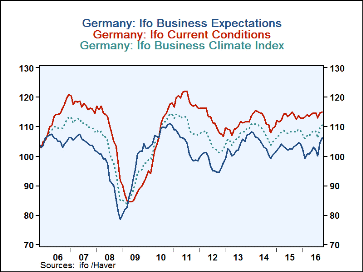 Global| Oct 25 2016
Global| Oct 25 2016IFO Advances and Holds the High Ground
Summary
The German IFO index made solid gains in October with the all sector index rising to 13.8 from September's 11.9 to stand in the 90.9 percentile of its historic queue of values. All the major early-release IFO gauges stand in the top [...]
 The German IFO index made solid gains in October with the all sector index rising to 13.8 from September's 11.9 to stand in the 90.9 percentile of its historic queue of values. All the major early-release IFO gauges stand in the top 20% of their respective queues of data. The reading for construction is on its high this month. The weakest sector is wholesaling which sits in the 80th percentile of its historic queue of data, and it is one of only two sectors to backtrack in October. Wholesaling fell back to a diffusion reading of 9.8 in October from 11.6 in September. Retailing also edged lower, drifting down to 7.8 from 7.9 to a still-strong standing at the 88th percentile of its historic queue of data.
The German IFO index made solid gains in October with the all sector index rising to 13.8 from September's 11.9 to stand in the 90.9 percentile of its historic queue of values. All the major early-release IFO gauges stand in the top 20% of their respective queues of data. The reading for construction is on its high this month. The weakest sector is wholesaling which sits in the 80th percentile of its historic queue of data, and it is one of only two sectors to backtrack in October. Wholesaling fell back to a diffusion reading of 9.8 in October from 11.6 in September. Retailing also edged lower, drifting down to 7.8 from 7.9 to a still-strong standing at the 88th percentile of its historic queue of data.
The IFO business situation gauge is up to 18.7 in October from 18.1 in September. That index standing is in the 86th percentile of its historic queue of data. Expectations are similarly strong. They rose even more robustly in October, jumping to a reading of 9.1 from 5.9 to an 88th percentile standing. Expectations are the most impressive portion of this report.
Business expectations' gain this month of a bit more than 3 points is solid but unspectacular. However, the gain comes on the heels of a sizeable rise in September; together the two-month rise has been greater only 4% of the time. That is eye-popping. IFO expectations are rising strongly and their level is high.
This sort of robustness is not depicted by any other of the EU index metrics for Germany. Nor do other EMU countries seem to be experiencing their own revivals comparable to such ebullience in Germany. In other reports, released today, French manufactures' sentiment eroded in October. In Italy, new industrial orders spurted but that only offset a similar drop from the month before. On trend, Italian orders are not exactly robust, but they are showing growth for the first time in a while although it is with a lot of volatility making that assessment less solid. The Markit flash sector indices, released just yesterday, were positive for Germany and the EMU but not exciting. And they were more equivocal for France. Moreover, there was only a sense of one-month strength in the Markit PMIs as that report lacked a solid history of building strength. In contrast, the IFO readings have been relatively high-valued for some time. Germany is definitely on solid economic footing; it is just hard to tell how really strong it is.
The IFO report is a very closely followed indicator. It is from a direct survey of firms operating in their various sectors. It is not, like the ZEW survey, a third party's observation or conjecture about what is going on. For that reason, the IFO is given a great deal more credibility than some other reports. The IFO assessment of most sectors and of overall business conditions is still quite good. But there is no new dynamism apart from this spurt in expectations, a spurt that is a bit hard to sort out as it stands so far apart from other readings.

Robert Brusca
AuthorMore in Author Profile »Robert A. Brusca is Chief Economist of Fact and Opinion Economics, a consulting firm he founded in Manhattan. He has been an economist on Wall Street for over 25 years. He has visited central banking and large institutional clients in over 30 countries in his career as an economist. Mr. Brusca was a Divisional Research Chief at the Federal Reserve Bank of NY (Chief of the International Financial markets Division), a Fed Watcher at Irving Trust and Chief Economist at Nikko Securities International. He is widely quoted and appears in various media. Mr. Brusca holds an MA and Ph.D. in economics from Michigan State University and a BA in Economics from the University of Michigan. His research pursues his strong interests in non aligned policy economics as well as international economics. FAO Economics’ research targets investors to assist them in making better investment decisions in stocks, bonds and in a variety of international assets. The company does not manage money and has no conflicts in giving economic advice.






